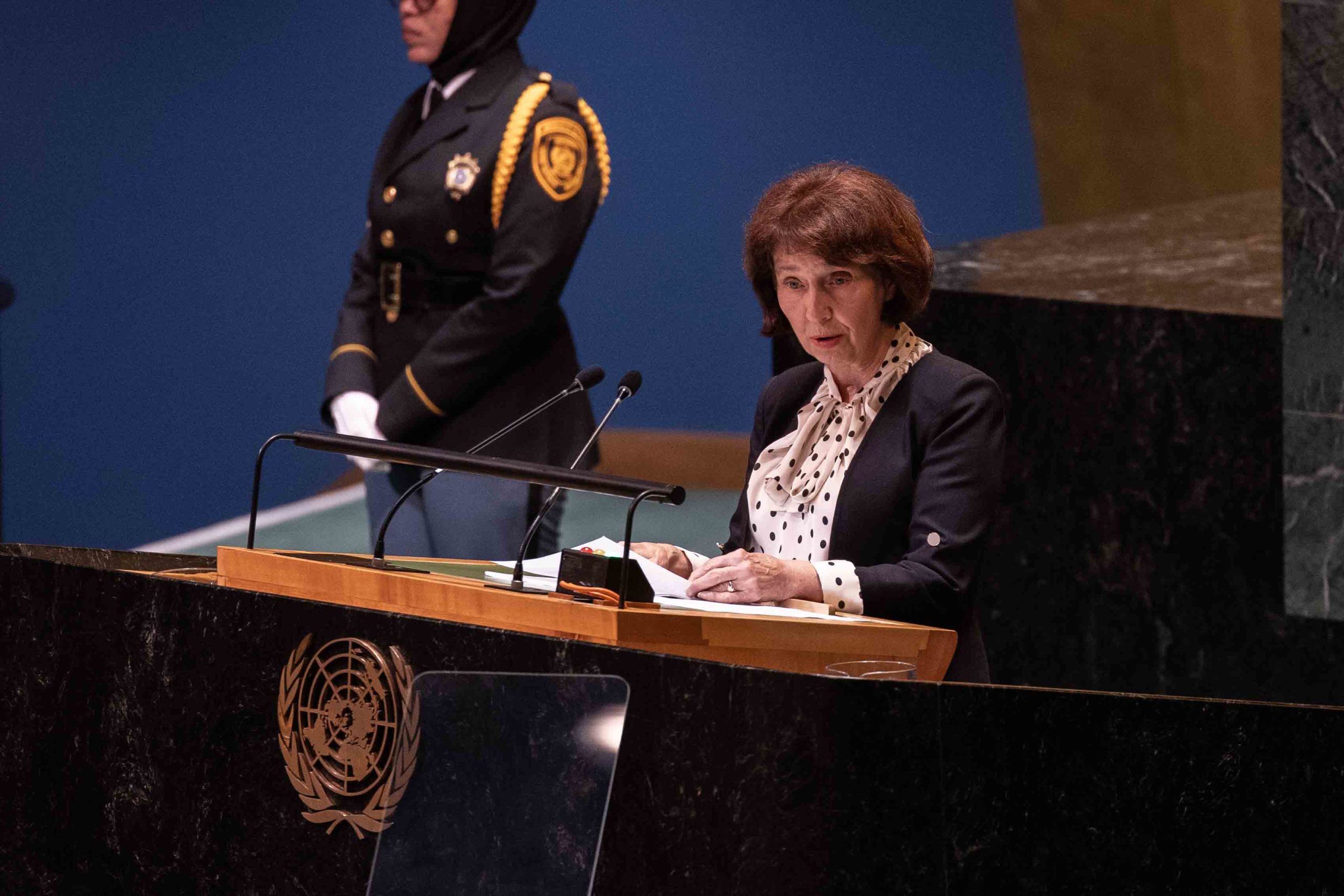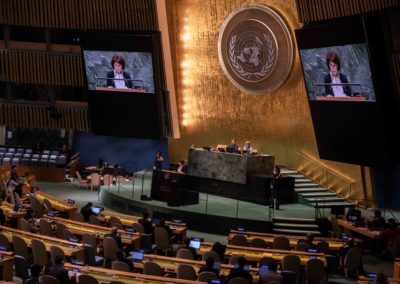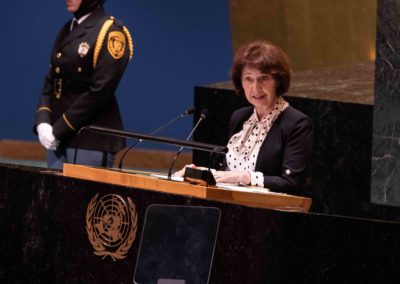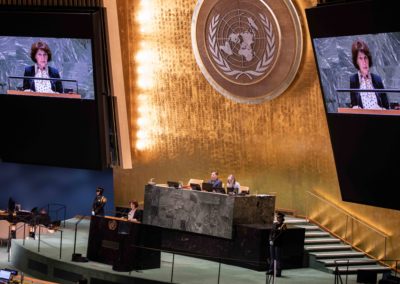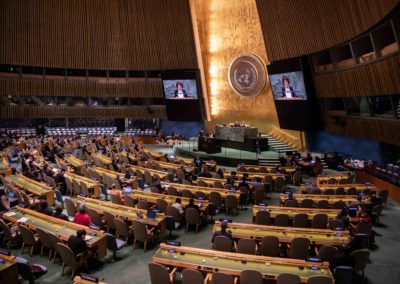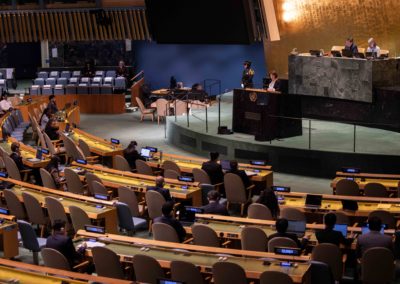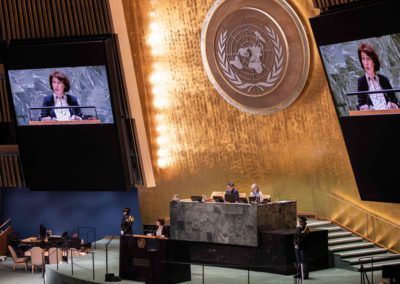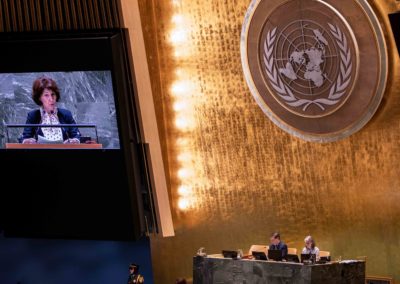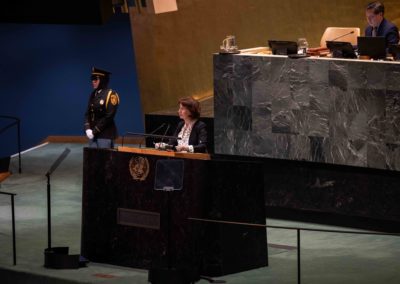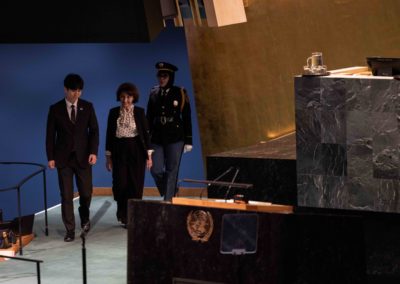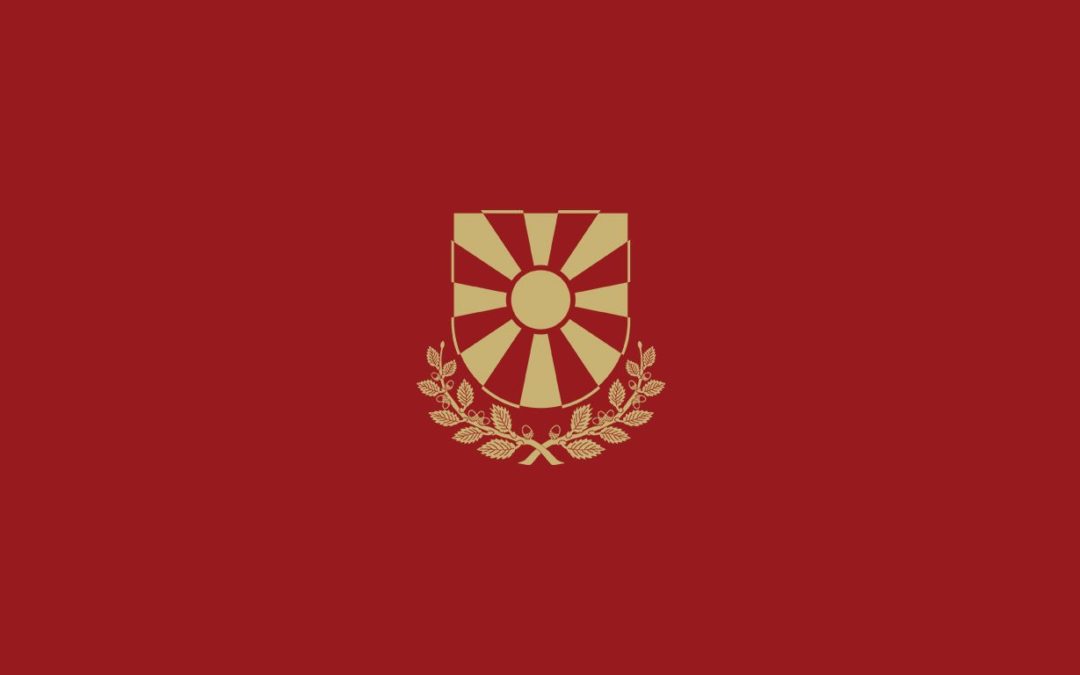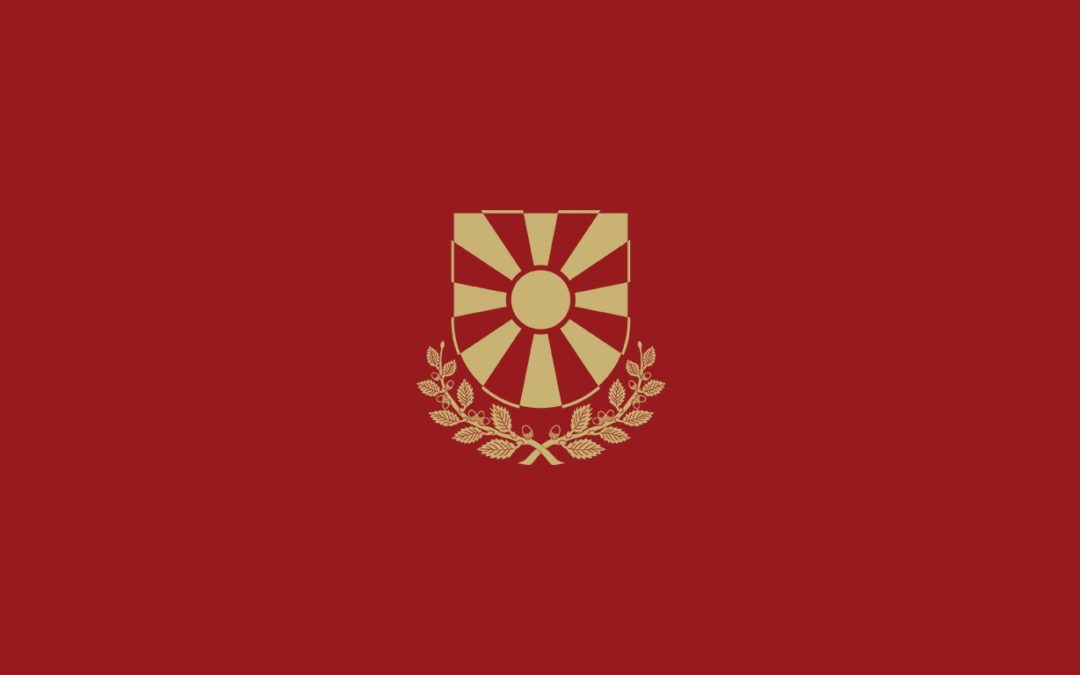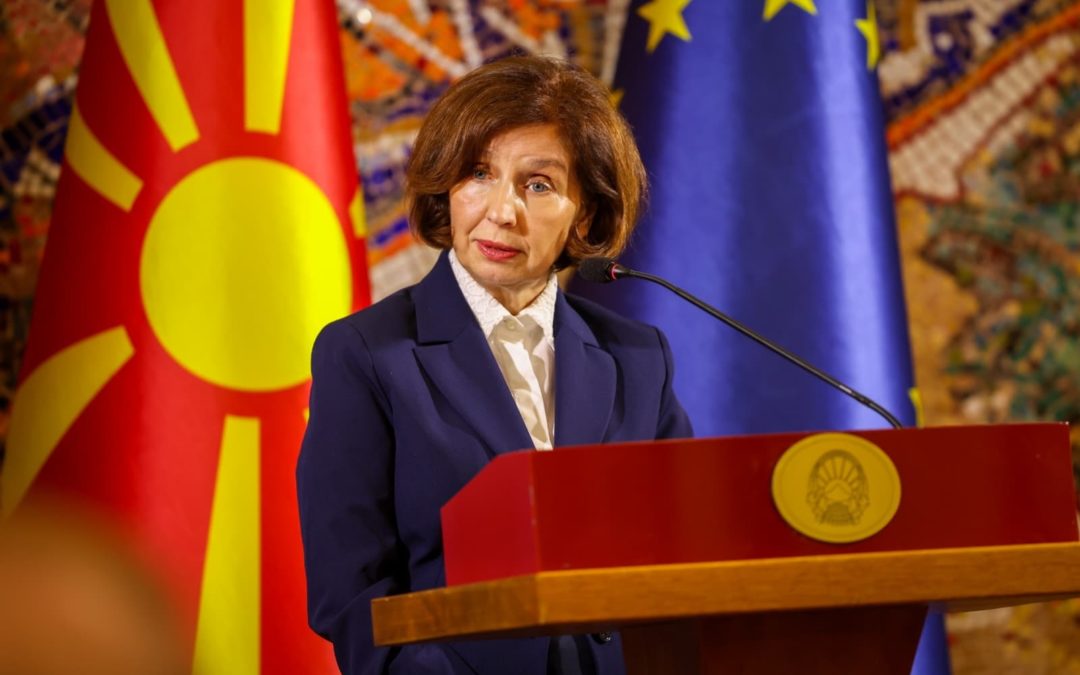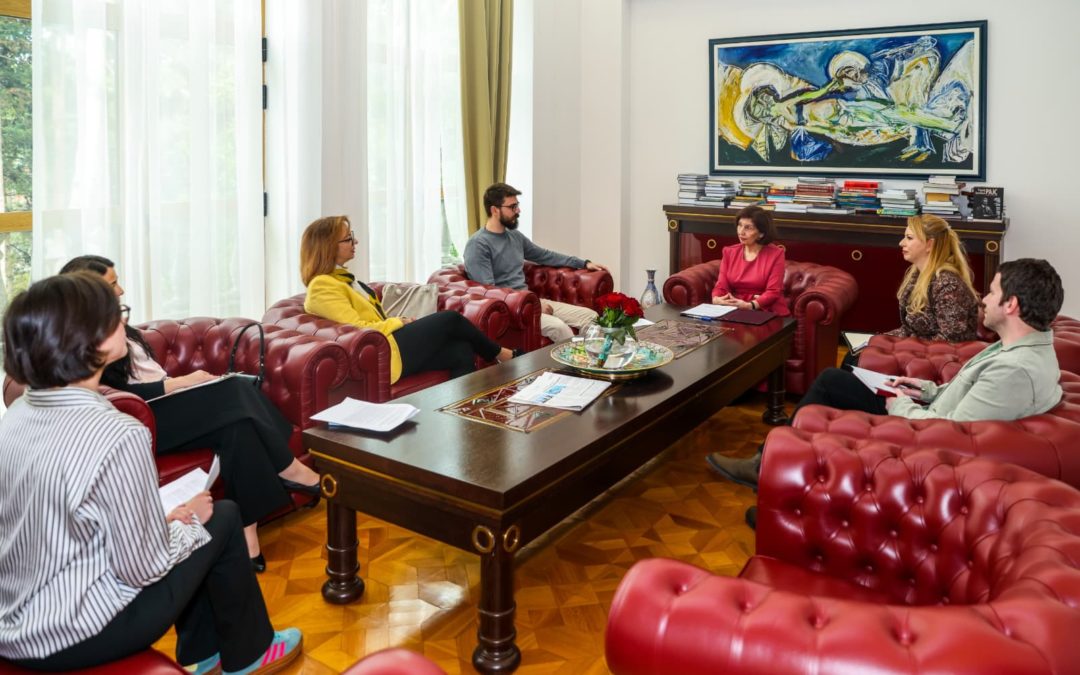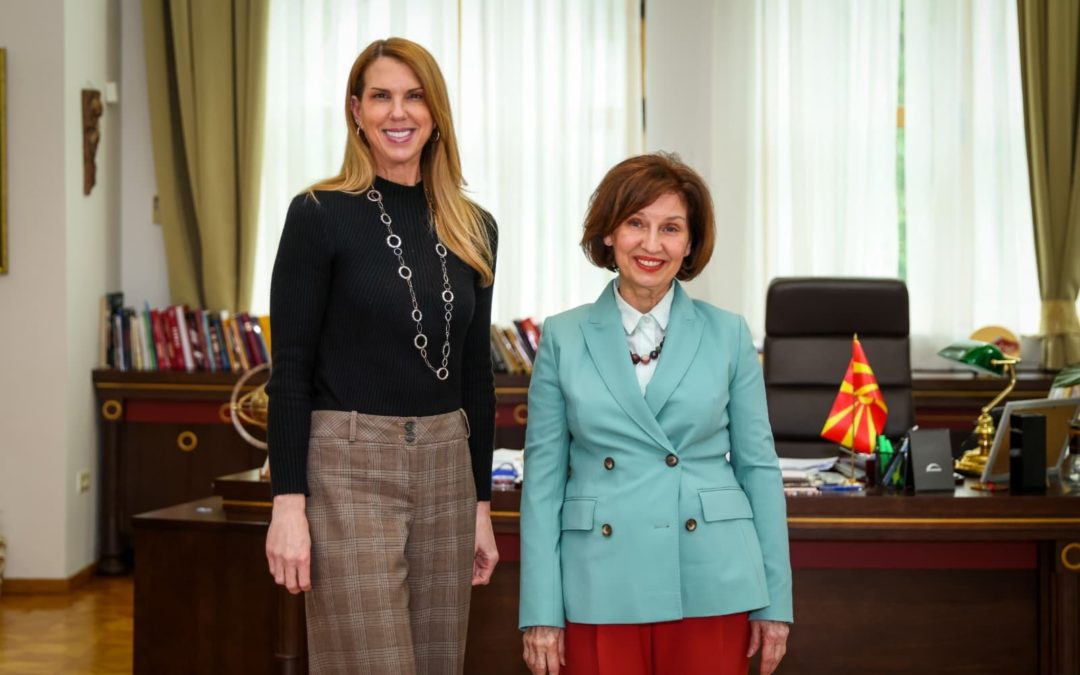President Gordana Siljanovska Davkova addressed the General Debate of the 79th session of the United Nations General Assembly, which is being held under the theme “Leaving no one behind: acting together for the advancement of peace, sustainable development and human dignity for present and future generations”.
Distinguished President of the United Nations General Assembly,
Esteemed Excellences,
Ladies and Gentlemen,
Those more familiar with the Macedonian case know about the Scyllas and the Charybides that my homeland, the small Balkan state, has passed through and is still passing through, which, although indirectly, as one of the six constituent Yugoslav republics, participated in the creation of the United Nations, upon its admission to the UN in 1993, has faced a great injustice. Namely, it was admitted under the temporary reference “Former Yugoslav Republic of Macedonia”, along with the additional condition “to negotiate until a final solution to the name issue is found”.
In 2018, the Prespa Agreement was however signed and ratified, after which an unsuccessful referendum and constitutional amendment by which, formally and legally, the Republic of Macedonia became the Republic of North Macedonia.
As a professor of constitutional law and as a former member of the Venice Commission, I know that what is legal is not always just and legitimate, because in the case of my country, it was not acted in accordance with international and national law, namely, the right to self-determination of every nation, guaranteed by the UN Charter and the SFRY Constitution of 1974 were forgotten.
The line that divides the legal from the just is sometimes merely a crack, but other times it is a deep gap and even an abyss. That gap, that abyss, most often and most severely affects the small nations and states that are the first victims of the clash between force and justice, because it can be an insurmountable obstacle to realizing the right to progress.
The new name is indeed a formal-legal reality and my country, the Republic of North Macedonia, as a responsible member state of the United Nations and NATO, fulfils its international obligations. Still, the EU membership, for which it did that, not only did not come true, but the Macedonian citizens are now facing a new, repeated “final condition” for another constitutional amendment, but now not for membership, but for the start of negotiations for the second time!
For us, membership in the EU, after 20 years of negotiations and 16 positive European Commission reports, resembles Mr. Godot, because we have been waiting for him since 2005, encouraged by international representatives with the refrain: “just this one condition more”, “just this one concession more”, “just this one constitutional amendment more”. Thus, we became a “sui generis” state, with 36 constitutional amendments in 30 years, anchored in the geo-political region called the “Western Balkans”!
As a peace-loving country, committed to good neighbourliness and regional cooperation, we expect understanding and cooperation with our neighbours, without the threat of a veto. If there is a veto, there is often no justice. The veto has turned into an instrument for bilateralization of the European integration, i.e. its stagnation. In conditions of conflict on the European soil, the stagnation of the European integration not only demotivates Macedonian citizens and slows down reforms, but also destabilizes the region of South-East Europe, leaving room for penetration of malignant imperial and great power influences.
Enlargement must be tied to the meritocratic Copenhagen criteria and freed from the veto linked to the attempt to revise history and disrespect national and cultural identity.
From our European and strategic partners, we expect understanding and fair unblocking of the process of negotiations for membership in the European Union, rejecting double standards and respecting our own principles and values, embedded in the fundamental constitutional documents.
The European reunification is like an unfinished symphony without us. The European Union is not only a political system but also a political philosophy in which the largest number of Macedonian and Balkan political actors and citizens believe. Integration is a powerful motive and key force for democratic development. The full integration of the Balkans into the EU will put an end to the endless redrawing of borders and balkanization as a phenomenon. But, of course, the Balkan states must behave in compliance with the European standards, regionally connecting and cooperating. The experience is valuable and the help of the countries of the region that have become part of the EU, as well as those that are on the European path, is expected. We must learn to support each other, as in the case with the COVID, floods and fires, instead of blocking each other on the European journey. Homo Balkanicus can be Homo Europicus whenever he wants!
Esteemed Excellences,
The line that divides the legal from the just is not only intertwined in the Macedonian case, but also in almost all issues that are on the United Nations agenda, including those covered by the topic of this year’s general debate: “Leaving no one behind: acting together for the advancement of peace, sustainable development and human dignity for present and future generations”.
We are faced with big questions:
- Let me start with the most important thing: peace. Is a just peace possible when we are faced with more and more wars and flagrant violations of the Charter of the United Nations? Is a just peace possible with the deepening militarization of politics and the new arms race?
- Is human dignity possible in a double standards environment, when human life is not equally valued and when the sufferings of innocent victims in conflicts are not treated equally?
- How can we achieve just development, plunged into the race for profit at the expense of the nations and the planet, when global public goods are sacrificed, marginalized, stuck at the periphery, forgotten in national and corporate policies and actions?
- How can we achieve social justice in conditions of growing economic, educational, gender and digital disparity between states and within the states themselves, with less and less winners and more and more losers of globalization and digitalization, the former sinking into decadence, and the latter into pauperization?
- How will we ensure generational justice if we continue with the irresponsible and uncontrolled exploitation of limited resources? How will we create a safe and sustainable future for our descendants if we continue with ecocidal production practices and consumer habits that leave a world choked with air pollution, poisoned with pesticides and littered with plastic?
- With the alarming level of greenhouse gas emissions that are rapidly leading to climate change with catastrophic consequences, can we even talk about responsibility, or should we start thinking about survival / ability to live? (sustainability vs. habitability.)
The main problem is that all these injustices are systemic, which means that if they are not legalized, then they are tacitly tolerated. What is legal, unfortunately, is not always just and moral, if I may say this once again.
Why is it so? In the most famous dialogue about power and justice, Thucydides recalls that “justice is a word that has value in disputes between men only when both sides are of equal strength; in other cases, the strong do what they can, and the weak what they must”.
But the United Nations exists to ennoble the cruel Thucydean world, by securing legal equality among nations, taming the power of the great and protecting the small nations. This legal equality is a prerequisite for achieving the highest goals of the United Nations – peace and security, human rights and sustainable development. The United Nations exists to bridge, or at least narrow, the gap between the legal and the just.
We are facing a big challenge: how can the legal become just, or how can the just become legal? And how can the legal and the just be implemented?
Respected attendees,
There are no simple, inexpensive and painless solutions to this dual challenge. Here, in this solemn hall of the General Assembly, for years, world leaders share their expectations and disappointments from the United Nations, which, not infrequently, oscillate between two extremes – utopian optimism, on the one hand, and nihilistic pessimism, on the other. Still, reality is complex and contains both successes and failures.
The United Nations has prevented another world war, but it failed to prevent and preclude regional conflicts, including the war in Ukraine and the bloodshed in the Middle East, the scenes of which resemble Picasso’s Guernica. The World Organization has lifted millions of people out of poverty, but it still fails to eradicate hunger.
With the right to self-determination, it accelerated the process of decolonization, but failed to bridge the gap between the global North and South.
The United Nations is the main driver for resolving global security, migration, health, environmental, energy and climate crises, but hardly any of them are fully and justly resolved.
The resolutions of this General Assembly reflect the will of the majority of nations, but are not always consistently respected.
The International Court of Justice is the ultimate instance of justice between states, yet its judgments are not always implemented, or even treated as advice.
The world is going through a turbulent geopolitical, economic, scientific, technological and industrial transformation in which man has a huge impact on the planet. I fear man is destroying the Garden of Eden and will be kicked out of it again unless the UN supports him.
But the competences, structures and procedures of the United Nations seem to have been frozen at the time of its founding in 1945. Instead of increased cooperation and action on pressing issues, the geopolitical rivalry and the new arms race are intensifying that are rapidly pushing us towards a state resembling a new, second cold war and Orwell’s world too!
We have rarely needed the United Nations as we do today. And, yet, the United Nations has rarely been as politically marginalized as it is today.
Ladies and gentlemen, dear colleagues,
To overcome this political marginalization, a new spirit of multilateralism is needed that will alleviate geopolitical rivalries and increase trust and cooperation among states around shared challenges. That multilateralism rests on three pillars.
- The first pillar is the consistent compliance with the Charter of the United Nations and international law, which exists to protect the weaker from the predatory instincts of the stronger.
In this context, the Macedonian state firmly perseveres on the stance that territorial claims and the attempt to acquire territory by force are a flagrant violation of the Charter of the United Nations. When dangerous precedents go unchallenged, they transform into tolerated practices that threaten world peace and security. Therefore, we support efforts for a sustainable, just and lasting peace in Ukraine, based on international law, including the UN Charter. In that regard, we have fully complied with the Common Foreign and Security Policy of the European Union.
This is important for us, since wars and conflicts also affect peace and stability of South-East Europe and the Western Balkans. Multilateralism also depends on the respect of international treaties. As a country committed to good neighborliness and regional cooperation, we respect bilateral agreements with our neighbors and expect our neighbors to respect the agreements without abusing the right to a veto.
- The second pillar of multilateralism is consistent implementation of the Sustainable Development Goals and the related Paris Agreement and the Sendai Framework for Disaster Risk Reduction.
At national level, with the support of the United Nations and its agencies, we are incorporating the 2030 Agenda into our long-term development strategies, policies and laws. High on our agenda are climate action and green and just transition, gender equality and fight against discrimination against women and girls, as well as inclusion of young people in decision-making processes. Two-thirds of the Sustainable Development Goals are directly related to the European legislation, so the United Nations helps us implement European reforms as well. We are indeed grateful for that.
- I see the third pillar of the new multilateralism in a greater commitment to the reform of the United Nations, which will be substantive, not cosmetic and corrective, reform that will unlock the potential of the United Nations and enable the voice of every state, large or small, be equally heard and valued.
The first set of reforms should help align the United Nations with new challenges and new development priorities. The more frequent extreme weather phenomena caused by climate change are just a prelude to what kind of future awaits us and our descendants if humanity’s attitude towards nature and the planet does not fundamentally change. We need a new social contract (Rousseau), but also a natural contract (Michel Serra) based on which we will treat nature as a partner!
The second set of reforms would cover the structures and procedures of the United Nations, starting with the voting rules, through financing, to the autonomy of the Secretary-General. As I said, if there is a veto, there is often no justice. It is an indisputable fact that the right to a veto is legal, but the question is how just is it, when it is used to paralyze processes on which the attainment of the goals of the Charter and the expectations of the peoples of the world depend? It is necessary for the General Assembly to be given a greater role in decision-making, as a representative body of the nations, in the spirit of: We, the Peoples, We, the Nations! The legitimacy of the Security Council springs from the General Assembly, so it should function as a kind of coalition government of nations!
The third set of reforms would strengthen the United Nations’ mechanism to protect vulnerable populations and groups, which is especially important today, when the number of victims and refugees is at its highest level since World War II.
Respected attendees,
Next year, we will celebrate the 80th anniversary of the founding of the United Nations. This year is the last call. The United Nations will either become an engine that moves the world towards a more humane, more just and sustainable order, based on inclusive and accountable governance, or will be reduced to a passive bureaucratized structure completely dependent on the main actors in the geopolitical processes and relations.
Only a fundamentally reformed United Nations can bridge the gap between the legal and the just and contribute to a truly transformed world, in which no one is left behind and forgotten. Like in the song of John Lennon, “Imagine”.
Thank you.

